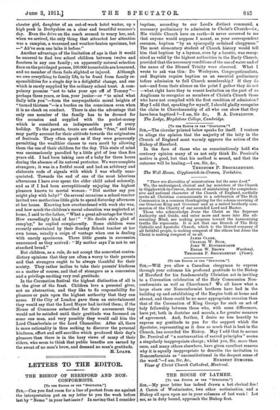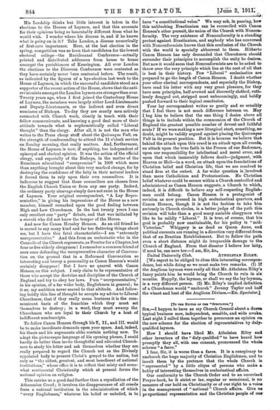THE HOUSE OF LAYMEN.
[To Tail EDITOR OF THE "SPECTATOR."]
Sin,—My poor letter has indeed drawn a hot clerical fire ! A Canon of Westminster, two other ecclesiastics, and a Bishop all open upon me in your columns of last week ! Let me, as in duty bound, approach the Bishop first.
His Lordship thinks but little interest is taken in the elections to the Houses of Laymen, and that this accounts for their opinions being so lamentably different from what he would wish. I wonder where his diocese is, and if he knows what is going on in it P Take London, a diocese numerically of first-rate importance: Here, at the last election in the spring, competition was so keen that candidates for the lowest electoral college—the Ruridecanal Conference—actually printed and distributed addresses from house to house amongst the parishioners of Kensington. All over London the elections to the Diocesan Conference were contested as they have certainly never leen contested before. The result, as indicated by the figures of a bye-election last week to the House of Laymen, in which the successful candidate stood as a supporter of the recent action of the House, shows that the anti- revisionists amongst the London laymen are strongerthan ever. Twenty years ago, when I first joined the Canterbury House of Laymen, the members were largely either Lord-Lieutenants and Deputy-Lieutenants, or the indirect and even direct nominees of Bishops. To-day they are mostly men actively connected with Church work, closely in touch with their fellow communicants, and knowing a good deal more of their attitude towards what is euphemistically called "Liberal thought" than the clergy. After all, it is not the man who writes to the Press cheap stuff about the Quieunqu,e Vult, on the strength of condescending to attend the 11 o'clock service on Sunday morning, that really matters. And, furthermore, the House of Laymen is now, if anything, too independent of episcopal and clerical opinion. It was the action of the official clergy, and especially of the Bishops, in the matter of the Runciman educational "compromise" in 1908 which more than anything brought about this very marked change, for by destroying the confidence of the laity in their natural leaders it forced them to rely upon their own counsellors. It is ludicrous to suggest that these counsellors are chosen from the English Church Union or from any one party. Indeed, the ordinary party cleavage simply does not exist in the House of Laymen. Your original correspondent, "A Lay Repre- sentative," in giving his impressions of the House as a new member, himself remarked upon the good feeling between High and Low Churchmen. In the last twenty years I can only recollect one "party" debate, and that was initiated by a recruit who did not know the temper of the House.
And now for Canon Hensley Henson. As an old friend he is moved to say many kind and far too flattering things about me, but I have this fatal characteristic—I am "extremely unrepresentative." And this from an ecclesiastic who in the Councils of the Church represents, as Proctor for a Chapter, but four or five elderly clergymen I I remember a common friend of ours once defending the unrepresentive character of Convoca- tion on the ground that in a Reformed Convocation so interesting and breezy a personality as Canon Reason's would certainly disappear! But I have no quarrel with Canon Henson on this subject. I only claim to be representative of those who accept the doctrine and discipline of the Church of England and try to obey her laws. ram "unrepresentative," in his opinion, of a far wider body, Englishmen in general ; be it so, my ambition never soared to that altitude. And follow- ing boldly this line of thought he accepts my advice to Liberal Churchmen, that if they really mean business it is the com- municant basis of the franchise which they must set themselves to destroy ; in a word, they must swamp the Churchmen who are loyal to their Church by a host of indifferent nondescripts.
To follow Canon Henson through his T., IL, and III. would be to make inordinate demands upon your space. And, indeed, his thesis and his arguments alike contain nothing new. To adapt the picturesque language of his opening phrase, I could hardly do better than invite thoughtful and educated Church- men to study his letter and ask themselves whether they are really prepared to regard the Church not as the Divinely appointed body to present Christ's gospel to the nation, but only as " tha oldest, greatest, and most beneficent of national institutions," whose office it is to reflect that misty and some- what sentimental Christianity which at present forms the national opinion on religion.
This carries us a good deal further than a repudiation of the Athanasian Creed ; it involves the disappearance of all creeds from a national institution in the administration of which "every Englishman," whatever his belief or unbelief, is to
have "a constitutional voice." We may ask, in passing, how this unblushing Erastianism can be reconciled with Canon Reason's other pursuit, the union of the Church with Noncon- fortuity. The very existence of Nonconformity is a standing protest against Erastianism, and anybody who has conversed with Nonconformists knows that this confusion of the Church with the world is specially abhorrent to them. Hitherto Canon Henson has only demanded that Churchmen should surrender their principles to accomplish the unity he desires. But now it would seem that Nonconformists are to be asked to throw over the very principle which lies at the root of all that is best in their history. Few "Liberal" ecclesiastics are prepared to go the length of Canon Henson. I doubt whether your other clerical correspondents, and especially the Bishop, have read his letter with any very great pleasure, for they have seen principles, half-avowed and discreetly clothed, ruth- lessly dragged out, stripped most unbecomingly, and boldly pushed forward to their logical conclusion.
Your lay correspondent writes so gently and so sensibly that I feel there is not much difference between us. May I beg him to believe that the one thing I desire above all things is to include within the communion of the Church of England the greatest possible number of devout and faithful souls P If we were making a new liturgical start, something, no doubt, might be validly argued against placing the Quicunque Yult in its present position. But it_is because we believe that behind the attack upon this creed is an attack upon all creeds, an attack upon the true faith in the Person of our Redeemer, upon our responsibility for intellectual and moral error, and upon that which inexorably follows death—judgment, :with Heaven or Hell—in a word, an attack upon the foundations of Christian belief and Christian life, that we are resolved to stand firm at the outset. A far wider question is :involved than mere Catholicism and Protestantism. No Christian belief whatever could be secure within a Church controlled and administered as Canon Henson suggests, a Church to which, indeed, it is difficult to believe any self-respecting English. man could belong. Canon Henson is a protagonist of revision as now pressed in high ecclesiastical quarters, and Canon Henson, though it is not the fashion to take him seriously in Church circles, is a better judge of the path this revision will take than a good many amiable clergymen who like to be mildly " LiberaL" It is true, of course, that his goal is probably now unattainable, for his policy is " mid- Victorian." Whiggery is as dead as Queen Anne, and political currents are running in a direction very different from that of an Erastian Establishment. But to follow the path even a short distance might do irreparable damage to the Church of England. From that disaster I believe her laity, if need be, can save her.—I am, Sir, &c., United University Club. ATHELBTAN RILEY. [We regret to be obliged to close this interesting correspon- dence, but while doing so we must make two remarks. (1) If the Anglican layman were really all that Mr. Athelstan Riley's fancy paints him he would bring the Church to ruin in six months. Happily, the layman, or shall we say the lay layman, is a very different person. (2) Mr. Riley's implied definition of a Churchman would " unchurch " Jeremy Taylor and half the wisest and best of the Anglican Divines.—ED. Spectator.]







































 Previous page
Previous page